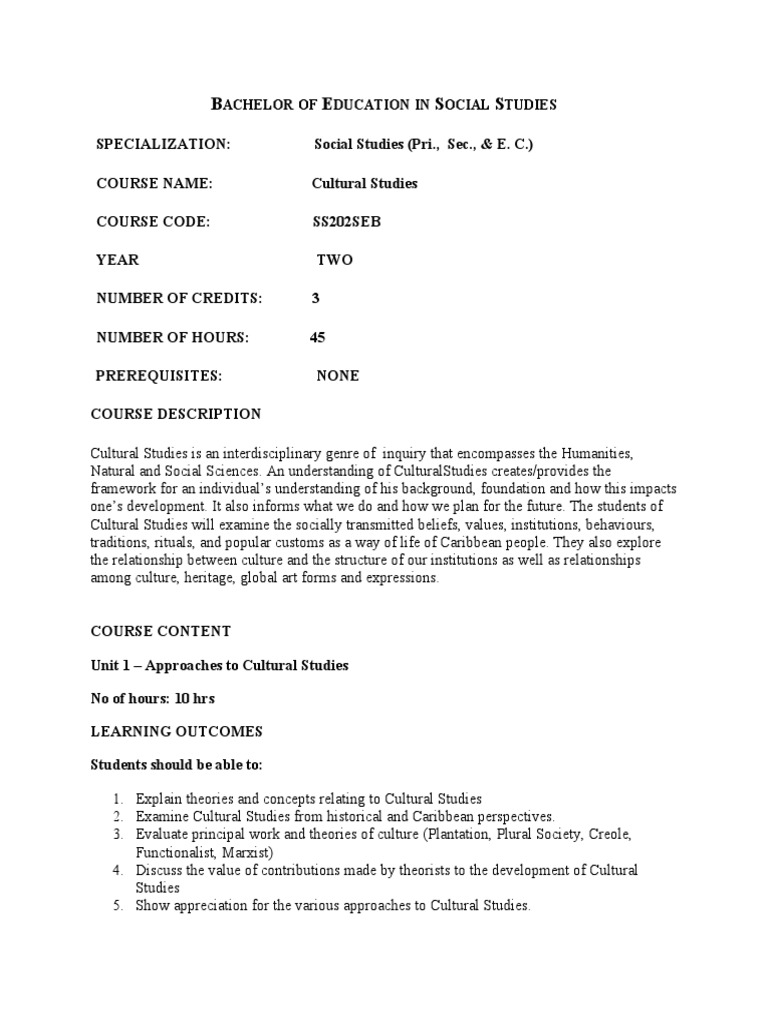In an era characterized by rapid globalization and sociocultural intersections, cultural studies emerges as an intuitive lens through which the intricate tapestry of human experience can be examined. It stands as a kaleidoscope, reflecting and refracting the myriad facets of culture, identity, and societal interactions. This academic discipline invites scholars and practitioners alike to delve deeper into the processes that shape our collective consciousness and individual narratives.
At its essence, cultural studies endeavors to decipher the complex interplay between culture and power, illuminating how the former is not merely a static repository of traditions, but rather a dynamic and often contentious battleground where ideologies clash. The significance of cultural studies lies in its interdisciplinary nature, drawing upon philosophy, sociology, history, anthropology, and even the burgeoning field of media studies. Much like a spider weaves its web, cultural studies intricately connects various threads of knowledge to create a coherent understanding of cultural phenomena.
The exploration of cultural identity within this framework reveals powerful insights. Culture is not monolithic; rather, it is a mosaic, comprised of diverse fragments that form a picture of human experience. These fragments are influenced by myriad factors, including race, gender, class, and geography. Each of these elements plays a pivotal role in shaping individuals’ perceptions of themselves and others, ultimately crafting a rich narrative tapestry that tells the story of humanity. The identity of a community is akin to a fabric, woven together by the struggles, triumphs, and stories of its people.
Beneath the surface of cultural identity lies an examination of everyday life as a site of meaning-making. Here, cultural studies sheds light on the mundane, illustrating how seemingly trivial aspects of life—like food, music, and fashion—serve as powerful symbols and sites of resistance. The notion of the ‘everyday’ as a cultural artifact is particularly poignant. Just as a river carves its way through the landscape, shaping the earth around it, the everyday actions of individuals shape the cultural context they inhabit. Speeches, films, and artistic expressions are akin to choreographed dances in a grand ballet of social interactions, illustrating the politically charged nature of cultural production.
In examining popular culture, cultural studies delves into the phenomenon of mass media and its profound influence on societal values and norms. This convergence of culture and mass communication poses critical questions: How does media shape our understanding of who we are? Or, conversely, how does our cultural background influence our media consumption? The relationship is symbiotic, akin to the relationship between fish and coral reefs; each sustains the other within a complex ecosystem of cultural representation. The slanting of narratives in films, music, and literature becomes a mirror reflecting societal attitudes toward topics such as race, gender, and sexuality, often challenging prevailing stereotypes while simultaneously reinforcing them.
Moreover, the discipline of cultural studies champions the idea that texts, whether they are books, films, or even sitcoms, should be understood not only as artistic expressions but also as vessels of meaning. Each piece of cultural text serves as a flashpoint for social discussions, revealing underlying power dynamics. This exploration uncovers layers of meaning, akin to peeling an onion, where each layer signifies different interpretations and implications, often touching on broader societal contexts.
Importantly, the study of representation—the portrayal of individuals or cultures within media—is a crucial tenet of cultural studies. Representation is fundamental in shaping public perceptions and attitudes, and it is often steeped in controversy. The depiction of marginalized groups frequently sparks debate about authenticity and stereotyping. Much like a painter who selects hues to evoke emotion on canvas, culture creators wield immense power in selecting narratives that either uplift marginalized voices or perpetuate a cycle of silence. This raises profound ethical questions about the responsibility of authors, filmmakers, and artists to represent truthfully the intricacies of human identity.
The impact of globalization on cultural studies cannot be overstated. As cultures interweave, elements of cultural exchange forge new identities and ideologies. This phenomenon is reminiscent of a melting pot, where ingredients blend to create unique flavors, sometimes clashing, sometimes harmonizing. However, the effects of globalization also bring forth concerns of cultural homogenization, where local cultures are overshadowed by dominant global narratives. The tension between preserving unique cultural identities and embracing global influences is a central discourse in cultural studies.
To confront these challenges, cultural studies advocates for critical engagement. It implores individuals and communities to interrogate cultural productions and look beyond mere consumption. By fostering a critical consciousness, one can unravel the layers of meaning that permeate cultural texts, allowing for deeper understanding and appreciation of diverse perspectives. Through this critical lens, cultural studies becomes a transformative practice—an act of social change that champions the underrepresented, redefines narratives, and champions a more equitable society.
In conclusion, cultural studies opens vast frontiers for exploration, striving to illuminate the multifaceted nature of culture. By navigating the complex interrelations of society, identity, and media, this field empowers individuals to interrogate their cultural environments critically. Just as a prism scatters light into a spectrum of colors, cultural studies dismantles the complexity of human experience, urging us to appreciate the intricate tapestry of culture in all its richness and diversity. Engaging with and understanding these cultural dynamics fosters an enriched societal discourse, paving the way for future generations to partake in the vibrant dance of culture, identity, and power.
